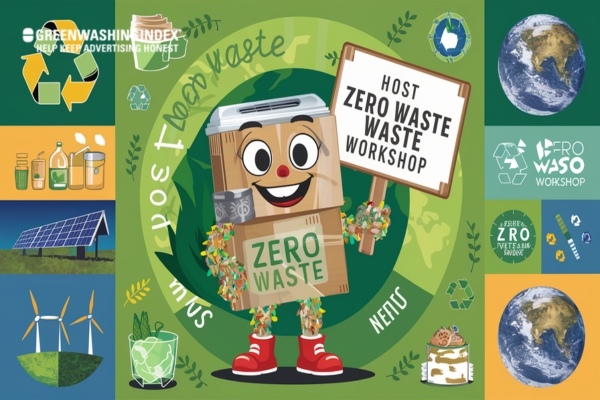

Walking into a room filled with vibrant discussions, hands-on activities, and a shared commitment to a greener tomorrow. That’s the magic of a Zero Waste Workshop. As we gather to learn and share, you’ll uncover simple yet impactful ways to reduce waste in your life.
Whether you’re a sustainability newbie or a seasoned eco-warrior, this journey will inspire and empower you to make lasting changes. Let’s dive into this exciting world and explore how each of us can contribute to a more sustainable future. Join us as we embark on this transformative adventure!
Hosting a zero waste workshop is an impactful way to educate others about sustainable living and inspire them to reduce their waste footprint. By sharing knowledge and practical tips, you can foster community engagement and motivate participants to adopt eco-friendly practices.

Organizing such a workshop involves careful planning, from selecting a suitable venue to deciding on the topics and materials. Below are the essential steps to successfully host a zero waste workshop.
Selecting the right venue is crucial for the success of your zero waste workshop. You need to decide whether it will be held online or in person. For in-person events, consider locations that align with your sustainability goals, such as community centers, libraries, parks, or cafes that share your vision.
Each venue has its advantages; for example, community gardens can provide a natural setting that inspires discussions about sustainable practices. When reaching out to potential venues, be clear about your workshop’s focus and how it aligns with their values.
If hosting online, ensure you have reliable technology and a platform that allows for interactive participation. Regardless of the format, accessibility is key—choose a location that is easy for participants to reach or a virtual platform that is user-friendly.
Choosing a relevant topic is essential for engaging your audience. Focus on practical aspects of zero waste living, such as DIY projects, sustainable shopping habits, or reducing single-use plastics. Gather necessary supplies based on your chosen topic; for instance, if you plan on conducting DIY activities like making reusable bags or cleaning products, ensure you have all materials ready beforehand.
Incorporating interactive elements like group discussions or brainstorming sessions to encourage participation. Providing handouts with tips and resources can also enhance the learning experience. Remember to emphasize the importance of using sustainable materials in all aspects of your workshop—from the supplies used in activities to any printed materials provided.
Determining whether your workshop will be free or have an admission fee is an important decision. If you’re investing time and resources into organizing the event, it’s reasonable to charge a fee to cover costs such as materials and venue rental. However, offering the workshop for free can encourage more participants and foster community engagement.
Consider offering sliding scale pricing or donation-based entry to make it accessible while still covering expenses. Clearly communicate your pricing structure in promotional materials so participants understand what to expect. Additionally, if you choose to charge a fee, consider providing value-added elements such as take-home kits or exclusive resources that justify the cost.
Effective promotion is vital for attracting participants to your zero waste workshop. Utilize social media platforms, community bulletin boards, and local organizations focused on sustainability to spread the word. Create engaging content that highlights the benefits of attending your workshop—such as learning new skills and connecting with like-minded individuals.
Collaborating with local businesses or influencers who share similar values can also help increase visibility. Don’t forget to include essential details like date, time, location (or link), and any costs involved in your promotional materials. Engaging visuals can make your posts more appealing and encourage shares among community members.
Creating an interactive environment during the workshop will enhance participant engagement and learning retention. Encourage questions and discussions throughout the session rather than just lecturing.
Incorporate hands-on activities where attendees can practice what they learn—this could include DIY projects or group brainstorming sessions on reducing waste in daily life. Use visual aids like slideshows or videos to illustrate key points effectively without relying on paper handouts whenever possible.
Foster a sense of community by allowing participants to share their experiences and challenges related to zero waste living; this can lead to valuable insights and connections among attendees.
After hosting your zero waste workshop, it’s beneficial to follow up with participants to reinforce learning and encourage ongoing engagement. Send out thank-you emails that include additional resources, links to relevant articles or videos, and summaries of key points discussed during the workshop.
Consider creating a social media group where attendees can continue sharing ideas and support each other in their zero waste journeys. Soliciting feedback through surveys can also provide insights into what worked well and areas for improvement in future workshops.
Building a community around sustainable practices not only keeps participants motivated but also fosters a culture of accountability towards reducing waste collectively.
By following these steps, you can create an informative and engaging zero waste workshop that empowers participants to make meaningful changes in their lives while contributing positively to the environment.
Organizing a Zero Waste Workshop comes with its own unique set of challenges. One major hurdle is managing waste efficiently. Traditional methods can lead to more waste, which is not what we want. Implementing systems for recycling and composting is vital to tackle this.
Another challenge is sourcing sustainable materials. Finding eco-friendly materials can be tough, as it requires working closely with suppliers who prioritize sustainability. This can make the process longer and more complex.
Engaging participants also poses a challenge. Some may resist new sustainable practices. To overcome this, it’s key to have effective education campaigns.
Potential solutions include:
Organizing a Zero Waste Workshop is a rewarding endeavor that contributes significantly to environmental sustainability. By understanding the core concepts of zero waste, planning meticulously, promoting effectively, and executing engaging sessions, you can inspire participants to embrace sustainable practices.
Challenges may arise, but with careful planning and strategic solutions, these can be overcome. Ultimately, a Zero Waste Workshop is not just an event, but a movement towards a greener future.
If you found this article helpful and are eager to learn more about sustainability and workshops, explore more insightful blogs on our site. Your journey towards a sustainable lifestyle starts here!
